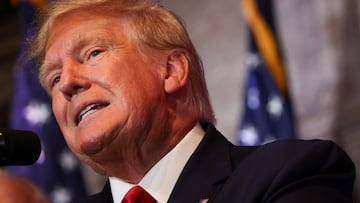Donald Trump could face charges over Stormy Daniels payment: What is a grand jury?
The investigation into a ‘hush money’ payment made on behalf of the former President has escalated with new hearings in Manhattan.

The longest-running criminal investigation into former President Donald Trump jumped up a notch on Monday when the Manhattan district attorney’s office began presenting evidence to a grand jury. The investigation relates to a ‘hush money’ payment allegedly made to porn star Stormy Daniels on behalf of Trump to cover up an affair between the two.
District attorney Alvin L. Bragg founded the grand jury as a precursor to deciding whether to charge Trump for his role in the payments, the New York Times reports. On Monday David Pecker, former publisher of The National Enquirer which first ran the story, appeared before the grand jury to give evidence.
Prosecutors are seeking to establish whether the $130,000 payment to Daniels, real name Stephanie Clifford, broke rules on campaign financing. In the Trump campaign’s records the payment is identified as legal expenses. Daniels has since asserted that the payment was part of an NDA preventing her from speaking publically about the affair.
What is a grand jury?
In federal court in the United States there are two types of jury. The trial jury is the form most commonly seen in movies and television, and consists of 6-12 members of the public who provide a final verdict on a case.
In contrast, a grand jury is impanelled to determine whether a federal criminal case can be brought by a prosecutor. Comprised of between 16 and 23 people, grand juries are asked whether there is ‘probable cause’ to believe that the individuals committed the alleged crime.
If the grand jury decides that there is sufficient evidence they will recommend that an indictment is brought against the individual. This is where Trump finds himself.
What next for Trump and the Stormy Daniel investigation?
Throughout the investigation Trump has denied any wrongdoing and claimed that the allegations are a partisan effort to discredit him. However this case has gained momentum in recent months after seeming to reach a dead end.
In the last month alone Michael Cohen, Trump’s former personal attorney and ‘fixer’, has met with prosecutors in Manhattan and is expected to give another interview in February. Cohen pleaded guilty in 2018 to charges related to the Stormy Daniel pay-out, and claimed that the payment was made “in coordination with, and at the direction of” Donald Trump.
The initiation of a grand jury suggests that the case against Trump is now progressing at a swifter pace. However we are still some way away from a conviction, or even from a fully-fledged court case involving Trump.
The former President could face a maximum sentence of up to four years if found guilty, but prosecutors would need to persuade someone from within his inner circle to testify against Trump. Despite Cohen’s assertion that Trump was aware of the payment made to Daniels, the investigation into financial impropriety relates to how to payment was cited in the Trump Organization’s filings.
The prosecution would have to prove that Trump was aware of how the payment was hidden, not simply that he approved its existence.






